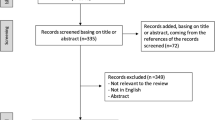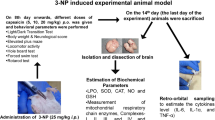Abstract
To date, there is still no specific treatment for neonatal hypoxic-ischemic encephalopathy and new therapies are urgently needed. The excessive neuroinflammatory response activated by hypoxia-ischemia plays an important role in the occurrence and exacerbation of hypoxic-ischemic brain injury in neonates. Metabolites extracted from plants exhibit positive anti-inflammatory effects, among which curcumin has been demonstrated to have powerful anti-inflammatory, antioxidant, and antitumor effects. In the present study, we explored the potential mechanisms by which curcumin protects against hypoxic-ischemic brain injury. On postnatal day 7, mice were randomly divided into three groups: the sham group, the HI+PBS group, and the HI+curcumin group. Curcumin (200 mg/kg) was administered to mice in the HI+curcumin group by intraperitoneal injection. The hypoxic-ischemic brain injury model was established by the Rice-Vannucci method, and the neuroprotective effects as well as the underlying mechanisms of curcumin on neonatal hypoxic-ischemic brain injured mice were analyzed using a neurobehavioral test (i.e., Morris water maze), 2,3,4-triphenyltetrazolium chloride staining, quantitative real-time polymerase chain reaction, and western blot methods. Curcumin inhibited hypoxia-ischemia insult-induced neurobehavioral deficits, cerebral infarction, and abnormal inflammatory responses in neonatal mice and further downregulated the acetylation level of the high-mobility group protein B1. In conclusion, curcumin attenuated hypoxic-ischemic brain injury in neonatal mice by inhibiting the neuroinflammatory response mediated by acetylation modification of HMGB1, thus providing a new theoretical basis for curcumin as a treatment for neonatal hypoxic-ischemic encephalopathy.
Graphical Abstract





Similar content being viewed by others
References
Afrin R, Arumugam S, Rahman A, Wahed MI, Karuppagounder V, Harima M, Suzuki H, Miyashita S, Suzuki K, Yoneyama H, Ueno K (2017) Curcumin ameliorates liver damage and progression of NASH in NASH-HCC mouse model possibly by modulating HMGB1-NF-kappaB translocation. Int Immunopharmacol 44:174–182. https://doi.org/10.1016/j.intimp.2017.01.016
Annink KV, de Vries LS, Groenendaal F, van den Heuvel MP, van Haren NE, Swaab H, van Handel M, Jongmans MJ, Benders MJ, van der Aa NE (2019) The long-term effect of perinatal asphyxia on hippocampal volumes. Pediatric Res 85:43–49. https://doi.org/10.1038/s41390-018-0115-8
Azzopardi D, Strohm B, Marlow N, Brocklehurst P, Deierl A, Eddama O, Goodwin J, Halliday HL, Juszczak E, Kapellou O, Levene M (2014) Effects of hypothermia for perinatal asphyxia on childhood outcomes. N Engl J Med 371:140–149. https://doi.org/10.1056/NEJMoa1315788
Bonaldi T, Talamo F, Scaffidi P, Ferrera D, Porto A, Bachi A, Rubartelli A, Agresti A, Bianchi ME (2003) Monocytic cells hyperacetylate chromatin protein HMGB1 to redirect it towards secretion. EMBO J 22:5551–5560. https://doi.org/10.1093/emboj/cdg516
Cui X, Song H, Su J (2017) Curcumin attenuates hypoxic-ischemic brain injury in neonatal rats through induction of nuclear factor erythroid-2-related factor 2 and heme oxygenase-1. Exp Ther Med 14:1512–1518. https://doi.org/10.3892/etm.2017.4683
Douglas-Escobar M, Weiss MD (2015) Hypoxic-ischemic encephalopathy: a review for the clinician. JAMA Pediatr 169:397–403. https://doi.org/10.1001/jamapediatrics.2014.3269
Finder M, Boylan GB, Twomey D, Ahearne C, Murray DM, Hallberg B (2020) Two-year neurodevelopmental outcomes after mild hypoxic ischemic encephalopathy in the era of therapeutic hypothermia. JAMA Pediatr 174:48–55. https://doi.org/10.1001/jamapediatrics.2019.4011
Gao Y, Fu R, Wang J, Yang X, Wen L, Feng J (2018) Resveratrol mitigates the oxidative stress mediated by hypoxic-ischemic brain injury in neonatal rats via Nrf2/HO-1 pathway. Pharm Biol 56:440–449. https://doi.org/10.1080/13880209.2018.1502326
Harris HE, Andersson U, Pisetsky DS (2012) HMGB1: a multifunctional alarmin driving autoimmune and inflammatory disease. Nat Rev Rheumatol 8:195–202. https://doi.org/10.1038/nrrheum.2011.222
Iside C, Scafuro M, Nebbioso A, Altucci L (2020) SIRT1 activation by natural phytochemicals: an overview. Front Pharmacol 11:1225. https://doi.org/10.3389/fphar.2020.01225
Jiang LJ, Zhang SM, Li CW, Tang JY, Che FY, Lu YC (2017) Roles of the Nrf2/HO-1 pathway in the anti-oxidative stress response to ischemia-reperfusion brain injury in rats. Eur Rev Med Pharmacol Sci 21:1532–1540
Le K, Chibaatar Daliv E, Wu S, Qian F, Ali AI, Yu D, Guo Y (2019) SIRT1-regulated HMGB1 release is partially involved in TLR4 signal transduction: a possible anti-neuroinflammatory mechanism of resveratrol in neonatal hypoxic-ischemic brain injury. Int Immunopharmacol 75:105779. https://doi.org/10.1016/j.intimp.2019.105779
Le K, Song Z, Deng J, Peng X, Zhang J, Wang L, Zhou L, Bi H, Liao Z, Feng Z (2020a) Quercetin alleviates neonatal hypoxic-ischemic brain injury by inhibiting microglia-derived oxidative stress and TLR4-mediated inflammation. Inflamm Research 69:1201–1213. https://doi.org/10.1007/s00011-020-01402-5
Le K, Wu S, Chibaatar E, Ali AI, Guo Y (2020b) Alarmin HMGB1 plays a detrimental role in hippocampal dysfunction caused by hypoxia-ischemia insult in neonatal mice: evidence from the application of the HMGB1 inhibitor glycyrrhizin. ACS Chem Neurosci 11:979–993. https://doi.org/10.1021/acschemneuro.0c00084
Lee S, Nam Y, Koo JY, Lim D, Park J, Ock J, Kim J, Suk K, Park SB (2014) A small molecule binding HMGB1 and HMGB2 inhibits microglia-mediated neuroinflammation. Nat Chem Biol 10:1055–1060. https://doi.org/10.1038/nchembio.1669
Li B, Concepcion K, Meng X, Zhang L (2017) Brain-immune interactions in perinatal hypoxic-ischemic brain injury. Prog Neurobiol 159:50–68. https://doi.org/10.1016/j.pneurobio.2017.10.006
Li J, An Y, Wang JN, Yin XP, Zhou H, Wang YS (2020) Curcumin targets vascular endothelial growth factor via activating the PI3K/Akt signaling pathway and improves brain hypoxic-ischemic injury in neonatal rats. Korean J Physiol Pharmacol 24:423–431. https://doi.org/10.4196/kjpp.2020.24.5.423
Li Y, Zhang JJ, Chen RJ, Chen L, Chen S, Yang XF, Min JW (2022) Genistein mitigates oxidative stress and inflammation by regulating Nrf2/HO-1 and NF-kappaB signaling pathways in hypoxic-ischemic brain damage in neonatal mice. Ann Transl Med 10:32. https://doi.org/10.21037/atm-21-4958
Nocito MC, De Luca A, Prestia F, Avena P, La Padula D, Zavaglia L, Sirianni R, Casaburi I, Puoci F, Chimento A, Pezzi V (2021) Antitumoral activities of curcumin and recent advances to improve its oral bioavailability. Biomedicines 9:1476. https://doi.org/10.3390/biomedicines9101476
Peng X, Wang J, Peng J, Jiang H, Le K (2022) Resveratrol improves synaptic plasticity in hypoxic-ischemic brain injury in neonatal mice via alleviating SIRT1/NF-kappaB signaling-mediated neuroinflammation. J Mol Neurosci 72:113–125. https://doi.org/10.1007/s12031-021-01908-5
Rocha-Ferreira E, Sisa C, Bright S, Fautz T, Harris M, Riquelme IC, Agwu C, Kurulday T, Mistry B, Hill D, Lange S, Hristova M (2019) Curcumin: novel treatment in neonatal hypoxic-ischemic brain injury. Front Physiol 10:1351. https://doi.org/10.3389/fphys.2019.01351
Schreglmann M, Ground A, Vollmer B, Johnson MJ (2019) Systematic review: long-term cognitive and behavioural outcomes of neonatal hypoxic-ischaemic encephalopathy in children without cerebral palsy. Acta Paediatr 109:20–30. https://doi.org/10.1111/apa.14821
Soleimani V, Sahebkar A, Hosseinzadeh H (2018) Turmeric (Curcuma longa) and its major constituent (curcumin) as nontoxic and safe substances: Rev. Phytother Res 32:985–995. https://doi.org/10.1002/ptr.6054
Tsai YM, Chien CF, Lin LC, Tsai TH (2011) Curcumin and its nano-formulation: the kinetics of tissue distribution and blood-brain barrier penetration. Int J Pharm 416:331–338. https://doi.org/10.1016/j.ijpharm.2011.06.030
Wang HC, Bloom O, Zhang M, Vishnubhakat JM, Ombrellino M, Che J, Frazier A, Yang H, Ivanova S, Borovikova L, Manogue KR, Faist E, Abraham E, Andersson J, Andersson U, Molina PE, Abumrad NN, Sama A, Tracey KJ (1999) HMG-1 as a late mediator of endotoxin lethality in mice. Science 285:248–251. https://doi.org/10.1126/science.285.5425.248
Wang Y, Wang LW, Gong ZJ (2019) Regulation of acetylation in high mobility group protein B1 cytosol translocation. DNA Cell Biol 38:491–499. https://doi.org/10.1089/dna.2018.4592
Yao HW, Kuan CY (2019) Early neutrophil infiltration is critical for inflammation-sensitized hypoxic-ischemic brain injury in newborns. J Cerebr Blood F Met 40:2188–2200. https://doi.org/10.1177/0271678X19891839
Yao D, Zhang WR, He X, Wang JH, Jiang KW, Zhao ZY (2016) Establishment and identification of a hypoxia-ischemia brain damage model in neonatal rats. Biomed Rep 4:437–443. https://doi.org/10.3892/br.2016.610
Acknowledgements
We thank Jinhua Liu for her help during the preparation of this manuscript.
Funding
This study was supported by the National Natural Science Foundation of China (Grant No. 82060290), the Natural Science Foundation of Jiangxi Province (Grant No. 20212BAB216040), the Science and Technology Planed Projects of Jiangxi Provincial Health Commission (Grant No. 202110021), and the Science and Technology Project of Jiangxi Provincial Administration of traditional Chinese Medicine (Grant No. 2020A0297).
Author information
Authors and Affiliations
Contributions
KL conceived and designed the study. XY and QX conducted the experiments. XY and KL drafted initial manuscript. KL and XY edited and revised the whole manuscript. All authors reviewed and contributed to the final version of the manuscript.
Corresponding author
Ethics declarations
Ethics Approval
All experiments were approved by the Animal Ethical and Welfare Committee of Southeast University (Animal Ethics No.20190215016) and Nanchang University (Animal Ethics No.W20210121).
Rights and permissions
Springer Nature or its licensor holds exclusive rights to this article under a publishing agreement with the author(s) or other rightsholder(s); author self-archiving of the accepted manuscript version of this article is solely governed by the terms of such publishing agreement and applicable law.
About this article
Cite this article
Yu, X., Xia, Q. & Le, K. Curcumin Attenuates Hypoxic-Ischemic Brain Injury in Neonatal Mice Through Inhibition of HMGB1 Acetylation-Mediated Inflammation. Rev. Bras. Farmacogn. 32, 767–773 (2022). https://doi.org/10.1007/s43450-022-00305-2
Received:
Accepted:
Published:
Issue Date:
DOI: https://doi.org/10.1007/s43450-022-00305-2




